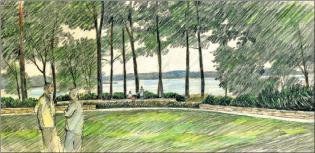Solving the Problems with PSWs The Future of Dialogue and Problem-Solving Workshops
Solving the Problems with PSWs The Future of Dialogue and Problem-Solving Workshops
 The Institute for Conflict Analysis and Resolution (ICAR), in cooperation with the International Peace and Conflict Resolution Program at American University, held a one-day workshop titled "The Future of Dialogue and Problem Solving Workshops" at Point of View. The workshop was held on Friday April 25, 2008, and was organized by Professors Ron Fisher at AU and Christopher Mitchell and Nadim Rouhana from ICAR.
The Institute for Conflict Analysis and Resolution (ICAR), in cooperation with the International Peace and Conflict Resolution Program at American University, held a one-day workshop titled "The Future of Dialogue and Problem Solving Workshops" at Point of View. The workshop was held on Friday April 25, 2008, and was organized by Professors Ron Fisher at AU and Christopher Mitchell and Nadim Rouhana from ICAR.
As a first in a planned series of workshops on improving the state of theory and practice in the methods of dialogue and problem solving, the workshop emerges from an interest in cultivating the next generation of practitioners for problem solving workshops (PSWs) and dialogues. The workshop was intended to assess the current state of problem solving, identify knowledge currently lacking, discuss issues limiting the development of practice, and chart future directions, including the training of practitioners and the application of the methods.
The workshop was divided into three sessions and included presentations by Dr. Fisher, Dr. Mitchell, Dr. Rouhana and Dr. Susan Allen Nan. Each session was followed by discussions by all workshop participants. Presentations focused on the current state of practice, questions and critiques on knowledge that is lacking, constraints and improvements, and training and application possibilities.
Among the points addressed in the workshop were the following:
-While there has been a proliferation of conflict resolution and dispute resolution graduate programs, there appear to be fewer opportunities for gaining the expertise necessary to carry out dialogues and PSWs.
-An assessment of the current state of problem solving workshops recognizes the need for the field to track projects occurring at various levels and categorize, define, and evaluate interactive conflict resolution work, starting with a clarified distinction between problem solving workshops and dialogues. A critique of the theory-to-practice nexus in problem solving workshops, as well as the constraints of basic human needs theory, demonstrates a need to revisit new theories supporting interactive conflict resolution.
The workshop began what is hoped will be a series of continuing programs to provide professional development opportunities for new practitioners of dialogue and problem solving workshops, and to apply these methods to violent and intractable conflicts between identity groups.
The rich conversation among conflict resolution scholars and practitioners reinforced the need to train new practitioners in problem solving workshops or interactive conflict resolution. In concluding the workshop's agenda, the workshop organizers proposed future opportunities for a linked training and practice program.
A report of "The Future of Dialogue and Problem Solving Workshops" is now online at http://icar.gmu.edu/pov.html



